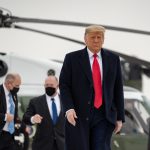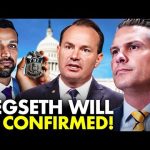As the year rolls to a close, one can’t help but reflect on the current state of leadership in the United States. Recently, the media made waves with headlines accusing Donald Trump of casting a “shadow presidency” over Joe Biden’s administration. However, this description seems more suited to the political theater than the actual substance of American governance. As the country grapples with a myriad of challenges both domestically and internationally, the question of true leadership looms larger than ever.
The notion of a “shadow presidency” suggests a lack of clarity about who is running the country. It raises an unsettling question that many Americans might be hesitant to confront: When did it become acceptable for the concepts of governance and leadership to blur? For centuries, the presidency has stood as the pinnacle of American democracy, a symbol of hope and stability. To suggest that an absence of decisive leadership exists within the White House does more than critique a politician; it calls into question the foundations of trust that underpin the very structure of our government.
To draw parallels with history, one might consider the United States during the chaotic years of the Civil War. Leadership then was equally fraught, but Abraham Lincoln emerged—not without controversy—intent on restoring order and unity. Lincoln’s ability to communicate a clear vision and take decisive actions has left an indelible mark on American history. In comparing this to the current dynamic, it becomes apparent that clarity of purpose and the will to act are just as important today. The claim that Trump has created a “two-headed presidency” insinuates a power vacuum that threatens the fabric of American governance. If the current administration is seen as inept, how do we mobilize around a leader who inspires confidence in the public’s ability to solve pressing challenges?
Moreover, the implications are not limited to domestic matters. Trump’s approach to foreign policy has sparked heated debate, especially regarding relationships with nations like Iran and Mexico. The historical backdrop of diplomacy reveals that strength and resolve often yield better outcomes than weakness and hesitation. When leaders globally know where the United States stands—as was the case during Trump’s previous term—there is a collective motivation to engage more seriously. The stakes are far too high for any nation to dismiss the might of American resolve, and this was a lesson learned from leaders throughout history, such as Theodore Roosevelt, who famously spoke softly but carried a big stick.
This reflection is not simply an exercise in nostalgia; it serves as a reminder that leadership is about clear communication and bold decisions. The American people often find themselves in a fragile state, divided among partisan lines. Yet, echoes of past unity can inspire hope today. As communities struggle with issues such as economic inequality and rising crime rates, the rhetoric that once offered solidarity seems increasingly absent. Exploring the power of ideas often reveals the heart of America—where dignity, opportunity, and respect are paramount. This brings us back to the nature of moral leadership and the responsibility that comes with it.
In this backdrop of uncertainty, historical lessons serve as critical signposts for today’s leaders. Effective governance requires not only addressing current issues but also cultivating a narrative that includes all Americans. The absence of unity and purpose breeds distrust, calling upon citizens to participate actively in shaping their future. Just as past leaders dared to tackle seemingly insurmountable challenges, so too must today’s leaders muster the strength to reclaim the mantle of trust that has slipped away.
As we look ahead to the new year, thoughtful leadership remains crucial. Whether one aligns with Trump, Biden, or any other emerging figure, there lies a foundational quest for a leader who clearly defines responsibilities and instills faith in America’s narrative. Through stories of both success and failure in governance, we are reminded that the torch of leadership cannot remain dim. Citizens must engage critically with their leaders, demanding clarity and integrity while channeling the spirit of courage that has shaped this nation.




